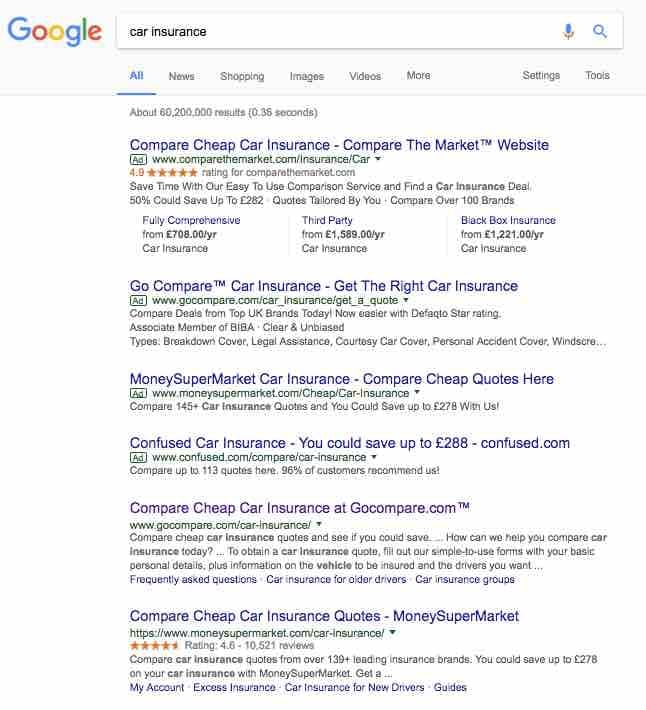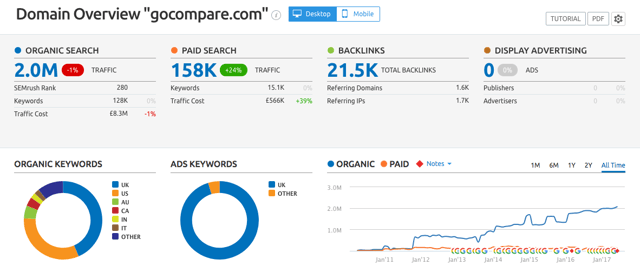An inbound marketing agency or growth agency is an organisation that helps businesses attract new customers without using outbound techniques such as email spamming or cold calling. Instead a process is used whereby you attract visitors to your website who are looking for what you offer. You do this in the hope they will contact you, or at least learn something useful so they feel positively disposed towards your business and contact you in the future. When you get it right, it delivers great business results.

When expertly executed, inbound marketing delivers leads or business enquiries.
Imagine you're trying to find a good plumber. Instead of someone knocking on your door trying to sell their services (that's like "outbound" marketing), you'd probably:
- Search online: You'd type "reliable plumbers near me" into Google.
- Look for helpful advice: You might read articles or watch videos on how to fix a leaky tap yourself (and then realise you need a professional!).
- Ask friends for recommendations: You'd look for someone trustworthy.
That's essentially what inbound marketing does. It's about:
- Attracting, not interrupting:
- Instead of pushing adverts at people who might not be interested, you create useful content that pulls in those who are actively looking for solutions.
- This could be blog posts, videos, guides, or social media posts that answer people's questions.
- Building trust:
- By providing valuable information, you show that you're an expert in your field.
- This helps people see you as a reliable source, making them more likely to do business with you.
- Creating lasting relationships:
- Inbound marketing isn't just about getting a quick sale. It's about building relationships with potential customers over time.
- By providing ongoing value, you can turn them into loyal customers who keep coming back.
Here's why it's powerful:
- It's cost-effective:
- Compared to traditional advertising, inbound marketing can be much cheaper.
- Creating online content can reach a large audience without breaking the bank.
- It targets the right people:
- By focusing on those who are actively searching for solutions, you're more likely to attract qualified leads.
- Those leads are more likely to become paying customers.
- It provides long-term results:
- Content created online can continue to attract leads for months or even years.
- This creates a steady stream of potential customers.
In simple terms, inbound marketing is about being helpful, not pushy. It's about attracting the right people to your business by providing them with the information they need.
Shall We Dance?
In a previous blog, we suggested a better way of developing a new website. It involved hiring an inbound or growth agency to carry out a road mapping exercise prior to the main project. The suggested approach applies to most web development projects but specifically when creating a lead generation website, a site built to attract traffic from Google™ resulting in qualified or at least part qualified enquiries.
To start this process you need to have some conversations with suitable inbound agencies, which begs the question, how do you choose an agency to help you with projects like this?
You're Looking For a Partner
First of all, creating a website that generates qualified leads is hard work, a real slog. Don't let anyone tell you any different unless you're in a specialist niche, have few competitors and hardly any websites offer what you plan to offer. This is rare. For most businesses competition is tough, their marketplace is noisy and getting found by prospective customers in Google and the other search engines

This means you're looking for an agency to be your partner, not a vendor. A vendor will usually only do what you ask them and unless you've got some in-house expertise to figure out what they need to do, that's not going to be a good use of your money.
A partner, on the other hand, will do a deep dive into your business and establish what it's going to take to get you from where you are, to where you want to be. A partner will have skin in the game because their success depends on yours.
- A Vendor:
- Someone you buy something from. You tell them what you want, they give it to you, and that's often the end of it.
- Like buying a new kettle. You pay, you get the kettle, job done.
- Focused on delivering a specific product or service, often with limited involvement beyond that.
- A Partner:
- Someone who's invested in your success. They work with you, not just for you.
- Think of a good accountant. They don't just do your taxes, they offer advice, help you plan, and want your business to thrive.
- Invested in your business goals.
Why an Inbound Marketing Agency Should Be a Partner
- They understand your business:
A good agency takes the time to learn about your business, your customers, and your goals. They don't just throw out generic marketing campaigns. They tailor their approach to your specific needs.
- They're invested in your results:
They're not just interested in getting paid. They want to see you succeed. They track their efforts, provide regular reports, and adjust their strategy as needed.
- They offer ongoing support and advice:
Inbound marketing is an ongoing process, not a one-off project. A good agency provides continuous support, offering advice and guidance to help you achieve your goals.
- They work collaboratively:
They become an extension of your team. They communicate regularly, share ideas, and work together to solve problems.
- They care about long-term growth:
A vendor is often interested in the next sale. A partner is interested in your business's long-term health.
Basically, an inbound marketing agency that acts as a partner is someone who's in it for the long haul. They're not just selling you a service; they're helping you build a sustainable and successful business. They are invested in your business growing.
Chemistry and Capability
If you were choosing someone with whom to undertake an expedition, you'd most likely want them to be capable and companionable. If they were capable but you didn't like them it might work, but there would be challenges. Equally, if you liked them but they were useless, that's not going to be great for either of you.
Chemistry is a funny thing. On paper, someone might be your kind of person, but when you meet them something doesn't gel. This is something you're going to have to figure out yourself, but it shouldn't be difficult. Where you might struggle is finding a capable agency.
Why Chemistry Matters
When you're picking an inbound marketing agency, it's not just about their skills and what they can do on paper. It's also about how well you get on with them – the "chemistry", as we say.
Think about it like this:
- They're an extension of your team:
An inbound marketing agency, when done right, becomes part of your business. You'll be working closely with them, sharing ideas, and collaborating on projects. If you don't click, it'll make everything harder.
- Communication is key:
Good communication is vital for any successful partnership. If you find it difficult to talk to them, or they don't seem to understand your vision, things are going to get messy. You need a team that you can easily chat to and who "get" you.
- They need to understand your brand:
Your brand is unique, and your agency needs to understand it inside out. If they don't gel with your company culture or your values, they won't be able to effectively represent you to your customers. That chemistry makes it easier for them to understand your brand's voice.
- Trust is essential:
You're entrusting your marketing to these people. You need to trust them to do a good job and to have your best interests at heart. That trust is built on good chemistry and a strong relationship.
- Long-term success:
Inbound marketing is a long-term strategy. You'll be working with your agency for months, or even years. If you don't enjoy working with them, it'll become a real drag. Getting on well makes that long term relationship much easier.
Basically, just like in any good relationship, you need to have that spark. You need to feel comfortable, confident, and excited to work with your inbound marketing agency. If the chemistry isn't there, it's probably not the right fit.
A Simple Test For Evaluating An Inbound Agency
Setting aside the chemistry, there's one very easy way to establish if the inbound or growth marketing agency you're thinking of talking to practice what they preach. You see, many agencies have jumped onto the inbound bandwagon because they understand web technology, not because they understand inbound and certainly not because they are using inbound for their own businesses.
If you buy into the idea that the best agencies to help you leverage inbound for your business are agencies who have leveraged inbound for themselves, here's a great way to check them out.
Fools Rush In
There's a fantastic tool called SEMRush. If you punch a domain name into it, it gives you a load of great information, including how much traffic the domain's website gets from Google, the search terms the website ranks for and how much it would cost to buy the traffic the site gets from organic search using paid search.
Now, that last bit might be a little confusing, the whole cost of paid search using an organic search equivalent. I'll clear that up now.
A typical search result in Google might look like this.

I searched for car insurance. The first four results are paid search results and those sites pay a fee to Google if someone clicks these links, that's why they are called Pay Per Click of PPC results, note the little green box with the word Ad inside it. The next two are organic results, they are number 1 and number 2 in the organic rankings because they deserve to be there as judged by Google's algorithm.
What SEMRush rather cleverly does is provide an amount of money it estimates a domain gets from free organic search expressed as the amount it would cost to buy that traffic using paid search or PPC.
For example, here's what GoCompare looks like, the first site in the organic rankings in the example above.

In this example, you can see it would cost £8.3M to buy GoCompare's organic traffic using PPC equivalent. That's per month. They are nailing it.
To check the agencies you're thinking of working with, simply go to SEMRush, enter their domain name and see what sort of traffic they get. If they are trying to suggest inbound is the way forward yet they don't appear to be using it themselves, ask them why not.
If they're doing inbound for themselves and they're good at it, you should expect to see their SEMRush Traffic Cost into the 1000's of
Is That Really A Good Measure?
 An agency with poor SEMRush results might argue these metrics are not a good indicator of capability. I fully accept some good agencies might have poor rankings for their own website whilst securing great results for their clients. However, this tool does provide at least some guidance on whether or not an agency practice what they preach, and if they don't, why don't they?
An agency with poor SEMRush results might argue these metrics are not a good indicator of capability. I fully accept some good agencies might have poor rankings for their own website whilst securing great results for their clients. However, this tool does provide at least some guidance on whether or not an agency practice what they preach, and if they don't, why don't they?
It might be because they are busy doing great work for their clients. It might be because they are new and working hard on their own rankings whilst working for clients or it might mean they've simply jumped on the bandwagon. That's for you to decide, but at least with this, you've got something concrete to go on.

